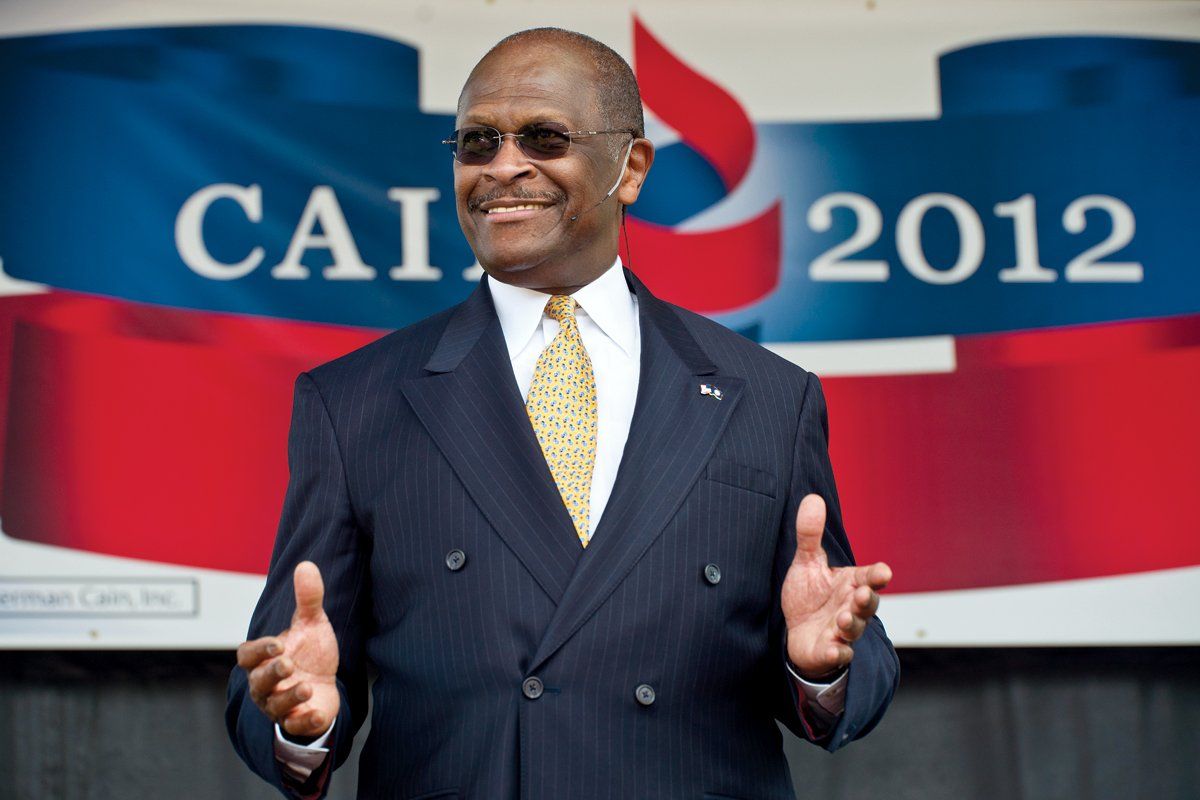
It's the end of the line for the hit (for a month anyway) situation comedy The Herman Cain Show—as something worth tuning into, anyway. As the obituaries are rushed to press, most of the experts will chalk the demise up to the candidate's inexperience and his staff's ineptitude. It's not that those things aren't true, but they miss the real point. The real culprit is Cain's bottomless vanity, and even though he may no longer be very interesting, there is a lesson in his collapse for all the candidates.
First, on the subject of the Herminator (a nickname he seems to have bestowed on himself, which is always a bad sign). I urge you, when you next find yourself in a bookstore, to pick up a copy of his newish book, This Is Herman Cain!, and flip through it. You need only reach page three to read how he "redefined campaign history" (he may have, but not in the way he means). Then flip ahead to the closing chapter to read how Cain will handle his first 90 days in office. The tone of serene self-adulation leaches so fulsomely out of every page that it practically gets on your hands. Many pundits have assumed that Cain wasn't really "serious" about his candidacy—that he was just trying to raise his profile, sell some books. But the book, it's clear from page one, is not the work of man who wasn't serious about his candidacy. He thought that the presidency was his destiny. Actually, I wouldn't be shocked if he still thinks it.
"CEO of Self" is Cain's pet phrase. He even wrote an earlier motivational book with that title. He invokes the phrase with regard to practically everything, from how he ascended the corporate ladder to his decision to eschew the tonsorial establishments of Atlanta and cut his own hair. But the question we'll never get an answer to, from him anyway, is how such a disciplined man could behave in such un-CEO-of-Self-like fashion as to think that the stories of Ginger White, the woman who claims she and Cain had a 13-year affair that he ended just recently, and the women who accuse him of harassment would never see the light of day.
The answer is simple: his astonishing narcissism. Now, all politicians are arrogant to one degree or another. And to seek the presidency, you pretty much have to be. Newt Gingrich is a megalomaniac who truly thinks on some level that he is Lincoln and Churchill and Teddy Roosevelt rolled into one—and America is doomed unless it elects him. Mitt Romney walks with the casual superiority of a man who's made a quarter of a billion dollars. Rick Perry has that Texas swagger (and not much else). And it certainly took some stones for a certain senator with just two years in office under his belt to decide in 2006 that he was ready to be president.
Vanity can be all right—for this job, it's a requirement. But the crucial point is that it has to be matched with something else. Credible and successful candidates for president are those who are able to marry their hyperinflated images of themselves to a vision of what the country needs. Putting aside how well or poorly he's performed since taking office, Obama got this exactly right in 2008: a clear majority of voters agreed that he was the best person to lead the country in a very different direction. They liked the story he told about himself; they liked even more the story he told about America.
What this year's candidates completely lack is a story about society that's remotely compelling to anyone outside the conservative base. Inside that base, it can be controversial even to acknowledge that something called society exists, since it implies paying for common goods. Of the lot of them, only Gingrich is really capable of thinking big thoughts, but many of his ideas about society—this recent notion that children should be janitors because child labor laws are "truly stupid"—are mad. So we're stuck with advertisements for themselves. And off to stage left, the president, despite his wobbly approval ratings, is smiling.
Uncommon Knowledge
Newsweek is committed to challenging conventional wisdom and finding connections in the search for common ground.
Newsweek is committed to challenging conventional wisdom and finding connections in the search for common ground.





